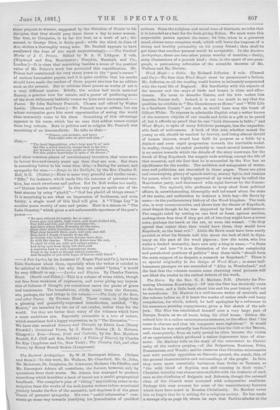Wooci Magic : a Fable. By Richard joffories. 2 vols.
(Cassell and Co.)—Wo fear that Wood Magic must be pronounced a failure. Mr. Toffories, as all the reading world knows, is intimately acquainted with tho rural life of England. His familiarity with the aspects of tho seasons and the ways of birds and beasts is close and affec- tionate. He loves to describe Nature, and his love makes him describe Nature well. Indeed, it is not too much to say that the qualities he exhibits in "The Gamekeeper at Home" and" Wild Life in a Southern County" are such as would have won the heart of Gilbert White. To express in admirable English what a writer knows of tho common objects of our woods and fields is a gift to be proud of, but it affords no proof that he can "hold discourse in fable ;" and Wood Magic, in spite of many felicitous passages, has the unpardon- able fault of tediousness. A book of this sort, whether meant for young or old, should be marked by brevity, and being almost devoid of human interest, would best fulfil its purpose as a fable by a distinct and even rapid progression towards the inevitable moral. In reality, though int ended probably to teach several lessons, there is no centre towards which the details of the story converge, for the death of King Kapchack the magpie ends nothing, except the life of that monarch, and the fact that be is succeeded by the Fox has no significance for the reader. The ambition and antagonism of states- men and politicians are travestied in these pages. There are plots and counterplots, plenty of speech-making, stormy fights, and treaties for peace, which are highly approved of by what may be called the Manchester party, and denounced with equal fervour by the Conser- vatives. The squirrel, who professes to keep aloof from political affairs, is, notwithstanding, thoroughly well informed about the state of the realm, and undertakes to instruct a little boy—Sir Bevis by name—in the parliamentary history of the Wood kingdom. The toad, also, is very communicative, and shows how the throne of Kapchack, cruel despot though he be, was supported by fear and self-interest. The magpie ruled by setting on one bird or beast against another, making them fear that if they got rid of him they might have a worse ruler, perhaps the hawk or the rat, or even the weasel. "So they agreed that rather than they would have these, they would have Kapohack, as the least evil." Little Sir Bevis must have boon sorely puzzled at what his friends told him about the lack of skill in diplo- macy on the part of the wood pigeons ; how the rooks, who live under a limited monarchy, have now only a king in name,—" a State fiction ;" and how "it is an illustration of the singular complexity and paradoxical positions of politics" that these birds "should form the main support of so despotic a monarch as Kapchack." There is no special originality in the design of Wood Magic ; in some half. humorous passages we are reminded of "Alice in Wonderland," and the fact that the volumes contain some charming rural pictures will not blind the reader to the radical defects of the work.
































 Previous page
Previous page